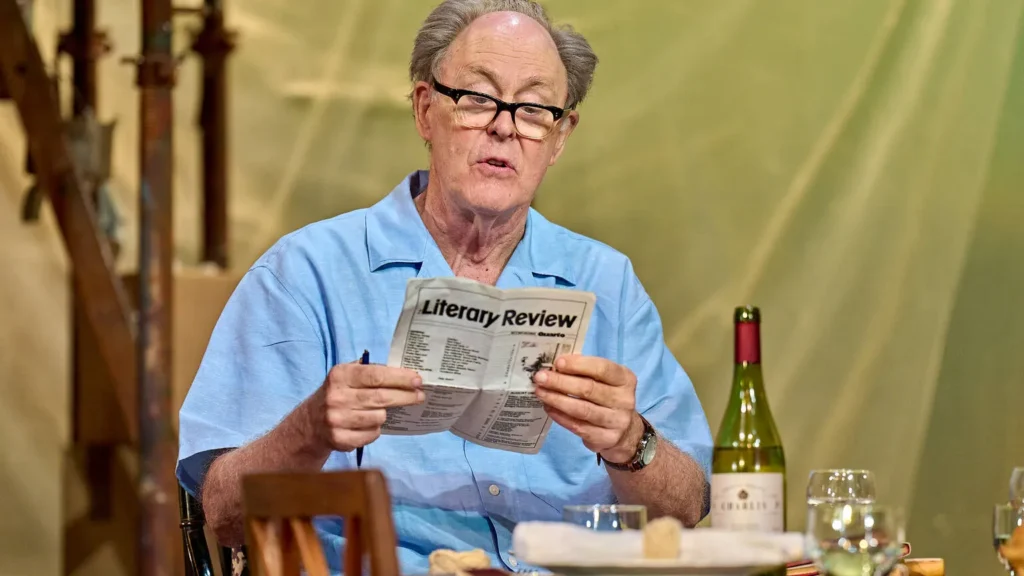Dorfman, National Theatre

Opinions varied quite considerably on just how good Tanika Gupta’s new play was, but the critics all praised Meera Syal’s performance as a woman developing Alzheimer’s. For some, the play covered familiar ground, for others it was poetic and profound. They were all impressed by the way the many elements of Pooja Ghai’s production combined to create a sense of how the disease feels from the inside.
[Links to full reviews are included but a number are behind paywalls and therefore may not be accessible]
Miriam Sallon for WhatsOnStage (5★) was impressed: ‘Tanika Gupta manages to include not just the plainly heartbreaking…but the profuse life already lived, as well as the many lives left to go on without protagonist Queenie. Her end is incredibly sad, but it is not her sum total, not even close.’ He said, ‘Meera Syal as Queenie is especially potent, her charm and dynamism morphing into belligerence and revilement and, later, into confusion and fear.’
A hyperbolic Anya Ryan in The Guardian (4★) said it ‘feels like a knife has been dug into your soul and twisted’. As for the star, ‘Syal shatteringly embodies Queenie, her movements gradually changing with each scene.’
Dave Fargnoli at The Stage (4★) said, ‘Images of flowing water and thematic echoes of King Lear ripple through this bleak drama… which unflinchingly depicts the guilt and frustration of caring for a loved one with Alzheimer’s’. He found, ‘Syal brilliantly charts Queenie’s deterioration, beginning with small hesitations and irritable flashes, moving through terror and cruelty, until she is a diminished, almost non-verbal shell of her former self.’
Debbie Gilpin at BroadwayWorld (4★) declared, ‘to be able to quickly switch from guttural rage to tearful confusion to childlike enthusiasm is no mean feat, but Syal pulls it off expertly.’ She called the production ‘entertaining, informative, and affecting.’
For the Telegraph (4★), Tim Robey said about Meera Syal’s performance ‘It’s angry. Visceral. Sometimes shockingly abrasive.’ He was also impressed by the production: ‘touches of stagecraft, poetic in their own right, capture a life unravelling’.
Aleks Sierz on TheArtsDesk (4★) commented, ‘Gupta’s writing mixes flashes of comedy even in the most tragic circumstances. But the general tone of her writing in this play is beautifully empathetic, with a really personal sense of deep emotion, carefully balanced between expressions of love and of loss.’
Julia Rank at WhatsOnStage (4★) said, ‘It could be unrelentingly bleak – and it doesn’t hold back in showing just how debilitating the disease is and how the pandemic robbed countless families of the chance to say goodbye to loved ones – but it’s a highly watchable piece given the subject matter. The tone is remarkably well-balanced with the right amount of light and shade and culturally specific jokes that have universal resonance.’
Tim Bano in The Independent (3★) disagreed. ‘Bleak’ was his word for it. He called it ‘an interesting but unsatisfying production.’ He said, ‘The second half is a pretty tough slog through her decline, which manages to be both depressing and a bit dull.’
For Tim Wicker at Time Out (3★) ‘Syal brings Queenie vividly to life’ but ‘The Lear-ness of it all also compacts the rest of the family’s relationships into a final international road trip that feels rushed…That said, this production still hits some powerful emotional beats as Queenie disappears into herself.’
The Times’ Clive Davis (3★) liked the production: ‘The dialogue is often flat and functional, with the underwritten subsidiary characters all slotted into place. But Pooja Ghai’s production oozes colour. The designer Rosa Maggiora creates a serene, Rothko-like backdrop…that places us somewhere between reality and the inside of Queenie’s jumbled mind. At moments when her faculties crumble, Elena Peña’s artfully muffled sound design and Matt Haskins’s nuanced lighting enhance the sense of disorientation. Nitin Sawhney’s percussive score evokes thoughts turning in circles.’
The i’s Fiona Mountford (2★) talked of ‘myriad elements that misfire, that strain for gravitas yet fail to achieve it.’ Her damning conclusion was ‘This is, unfortunately, not a piece of new writing worthy of the National Theatre.’
There was no rating accompanying Lucy ‘s review at CityAM but she said it ‘isn’t just an excellent work of fiction, but a bleak, vital conversation about how we treat our elderly.’
Critics’ Average Rating 3.6★
A Tupperware of Ashes is at the Dorfman in the National Theatre until 16 November 2024. Buy tickets direct from the theatre.
If you’ve seen A Tupperware of Ashes at the National Theatre, please add your review and rating below








